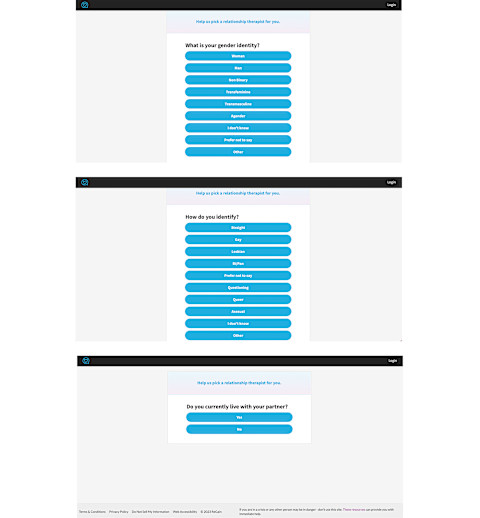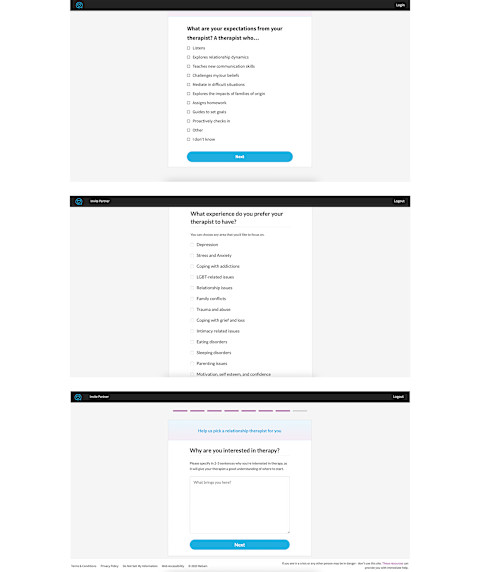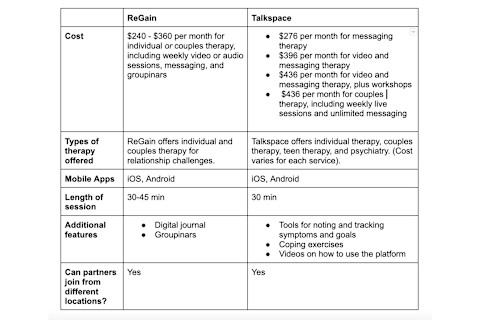Everything You Need To Know About ReGain Couples' Therapy + Who Should Try It

I will be the first to admit that couples' therapy has been a huge help to my relationship—but finding a couples' therapist that both my partner and I actually connect with is a different story. The growing prevalence of online therapy has made the process a bit easier, no longer limiting us to therapists who are within walking or driving distance. Of course, with more options comes inevitable overwhelm, and it's hard to know which online therapy platforms to trust. All that's to say, when I was given the opportunity to try and review ReGain couples' therapy, I jumped at the chance. Keep reading for everything you need to know before trying ReGain for yourself.
What is couples' therapy?
Couples' therapy, often referred to as marriage counseling, is a type of therapy that focuses on improving the relationship between partners, whether there is a glaring issue or not. Kimberly Tyler-Brown, LMFT, couples' therapist, says you might consider seeing a couples' therapist if you and your partner are growing emotionally distant, frequency of sexual intimacy is changing, trust has been broken, conflict is escalating, you're making hurtful and nasty comments, or attachment insecurities are arising.
"[In couples' therapy] I am an unbiased third party who is there to understand the couple's concerns and improve their communication, empathy, intimacy, and trust," Tyler-Brown explains.
Several studies have found couples' therapy to be very effective at improving relationship satisfaction, communication skills, and resolving conflict.
In fact, one study showed that 70% of couples who attend couples' therapy see positive improvements in their relationship. There is limited research, so it's hard to say exactly how many couples stay together after couples' therapy—but it can be a helpful tool at any stage in the relationship, and those who successfully engage in couples' therapy will likely be benefited in their individual lives outside of the relationship as well.
What is ReGain?
ReGain is an online therapy platform owned by parent company, BetterHelp. ReGain is specifically designed for couples and people facing relationship struggles, no matter what stage they're at in their relationship. The platform offers 30- to 45-minute therapy sessions for both individuals and couples, with couples' therapists and professionals who specialize in related challenges or conditions such as anxiety, stress, depression, anger, addiction, LGBTQ+ matters, ADHD, bipolar disorder, and chronic pain.
With a ReGain subscription, members have access to weekly audio or video calls with their therapist. What really sets this platform apart is the access you have to your therapist between sessions, with unlimited 24/7 messaging capabilities. Therapy sessions can be performed through a tablet, computer, or phone, and you and your partner can join from separate locations or devices if desired (hello, long-distance couples' therapy).

How does ReGain match you with a therapist?
ReGain strives to make therapy as convenient and easy as possible, prioritizing your unique preferences and needs. The brand does this through an in-depth intake process in which you'll answer specific questions about your preferences, goals, and experience with therapy. From there, you'll be matched with a licensed therapist who fits your needs.
The entire intake process takes around 10 to 20 minutes and includes questions about your age, marital status, etc., as well as questions about why you're seeking therapy, what topics you'd like your therapist to have experience with, and if there are any focus areas that interest you. If this sounds overwhelming, you'll be happy to hear that the answers are multiple choice—and providing this information early on is a big part of what helps set you up for success with your matched therapist.
If you're someone who wants support with conflict resolution or parenting, but you'd also like your therapist to be experienced in eating disorders, anxiety, or other mental health issues, for example, ReGain will strive to match you with a qualified therapist that fits these needs.
You can also indicate on the intake forms additional preferences for your therapist, including their gender, if you prefer an older therapist, someone who is Christian-based, someone who is nonreligious, or an LGBTQ+ therapist. While there is not a prompt to request a specific race or ethnicity, there is a dedicated customer service team you can reach out to with this request.
After you've completed your intake, it can take anywhere between a few minutes to 48 hours for ReGain to match you with a therapist. And, to answer the question you've all been wondering: If you don't feel the therapist you've matched with is a great fit upon reading their bio (or after you've had a session with them), you can simply ask to be matched with a new therapist. This is a huge benefit, as many platforms do not offer the option to change—and searching for a therapist can be very involved.

How much does ReGain cost?
ReGain costs between $60 and $90 per week, billed monthly at $240 to $360. ReGain services are only offered on a subscription basis, and the cost varies depending on location, preferences, and therapist availability.
While ReGain does not accept insurance, the platform does offer financial assistance, which anyone can apply for. Eligibility is based on employment status, household income, whether or not you have children, if you're receiving benefits from federal programs like SNAP, and other factors.
Customer service is easy to reach, and I spoke with a helpful team member who said ReGain is always happy to work with members to lower the price and find more affordable options. Conveniently, there are no startup costs besides the basic monthly membership cost.
What's included in a ReGain subscription?
In addition to unlimited, 24/7 messaging and weekly audio or video calls with your therapist, a ReGain subscription includes a digital journal that can be accessed immediately after completing the intake process. It's up to you if you want your journal entries to be kept private, or they can be sent directly to your therapist and partner (if you're doing couples' therapy). There are even journal prompts specifically for anxiety, depression, or relationship issues. Multiple studies have shown journaling to have a positive impact on your mental and emotional health1, and it's often used in individual psychodynamic psychotherapy, CBT, DBT, and family therapy.
As a member, you'll also have unlimited access to Groupinars, which are hosted by ReGain therapists and cover specific topics related to grief, relationships, trauma, anxiety and depression, anger, or substance abuse. Attended anonymously, the Groupinars are great for someone who wants professional support on a specific issue that they may not always have time to discuss in their sessions. For example, I was excited when I saw sessions on creating healthy sleep habits, healing from pet loss, and recovering from race-based traumatic stress.

Is ReGain worth it?
After attending couples' therapy with ReGain, I do think the platform is worth it. I tend to err on the side of skepticism when it comes to online medical providers, but after trying ReGain, I would recommend it to other individuals and couples.
After our first couples' session, my partner and I were each quick to comment on how comfortable we felt with our therapist. We sought out couples' therapy to improve our communication skills and resolve conflict. Our therapist recommended practical conflict resolution methods to integrate outside of therapy, which have already begun to impact our relationship. The ability to apply these skills outside of sessions is a pivotal part of therapy and is a great way to measure how effective your therapy journey has been.
Financially speaking, I found ReGain to be a better option than in-person out-of-pocket couples' therapists I have tried. Couples' therapy is typically not covered by insurance and can range from $100 to $250 or more per session. This adds up to $400 to $1,000 per month if you're doing weekly sessions, making ReGain's monthly subscription at $240 to $360 much more affordable.
ReGain saved me substantial time and energy in the therapist matching department. There's nothing more disappointing than spending time researching and vetting a therapist, only to find it's not a match after a few sessions—and if you're opting for couples' therapy, you inevitably have two people's preferences to consider, not just your own. ReGain completely handles the process of finding a new therapist, taking the pressure off you and your partner, so you can focus on the issues you came to discuss.
One qualm I had is that if you are in couples' therapy with a partner, there is not an option to send a private message to your therapist. Additionally, nowhere in the intake or on the platform did it ask for my pronouns, which was disappointing.
ReGain vs. Talkspace.

Regain and Talkspace both offer individual and couples' therapy, while Talkspace also offers teen therapy and psychiatry. Regain costs $240 to $360 per month, which includes weekly video or audio sessions, messaging, a digital journal, and Groupinars. Talkspace costs a bit more and has a few tiers of pricing: $276 per month for messaging therapy, $396 per month for video and messaging therapy, $436 per month for video and messaging therapy, plus workshops, or $436 per month for couples' therapy with weekly video sessions and messaging.
Regain sessions are 30 to 45 minutes, whereas Talkspace sessions are just 30 minutes each. Both platforms are available via an app on your phone or on a desktop computer, and both have the option for partners to join from separate locations. In terms of additional features offered, Regain has the digital journal and Groupinars, while Talkspace has digital tools for tracking goals and progress, a number of coping exercises, and tutorials on how to use the platform.
FAQ
Is ReGain trustworthy?
ReGain is a trustworthy online therapy platform for couples and individuals. ReGain is owned by BetterHelp and every ReGain therapist is licensed and an accredited psychologist (PhD/PsyD), licensed marriage and family therapist (LMFT), licensed clinical social worker (LCSW/LMSW), or licensed professional therapist (LPC or LPCC). All ReGain therapists are required to have a master's degree or doctoral degree and license in their state.
You're also not required to provide your full name and can instead choose a nickname to be identified by. State and federal laws make all communication between you and your therapist private and secure, the platform uses software
to make all messages encrypted, and there's even an option to "shred" your message thread with your therapist so it will not even show up in your account.
Does ReGain give refunds?
No, ReGain does not give refunds.
Does ReGain have a free trial?
No, ReGain does not have a free trial.
How do I privately message my therapist on ReGain?
To message your therapist on ReGain, log in to the ReGain platform. Once there, navigate to the "Therapy" tab at the top left corner of the page, next to "Journal" and "Groupinars." Your chat with your therapist will appear. If you're in couples' therapy, however, any messages you send in the chat can be seen by both your therapist and your partner. Unfortunately, there is no way to message your therapist privately from your partner.
The takeaway.
Couples' therapy can be a great tool for a couple or individual in any stage of a relationship—but finding the right therapist can be time-consuming and overwhelming. ReGain is an excellent resource for anyone who wants to quickly find a therapist specialized in their unique relationship challenges, life experiences, and mental health issues. While I was skeptical of online therapy platforms, after trying couples' therapy with ReGain, I would quickly recommend this service to friends. ReGain is not the best option for anyone whose insurance covers couples' therapy but is a much more affordable option than paying out-of-pocket for sessions.


